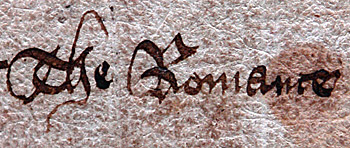Generides
General Information
Plot Summary

Sirenydes, wife of King Aufreus of India, is having an affair with his steward, Sir Amalek. One spring, Aufreus loses his men while hunting and finds himself outside a marvellous jewelled castle. Inside he meets Sereyne, the beautiful princess of Syria, and her elderly companion, an exiled Sage of Rome. Sereyne tells Aufreus of Sirenydes’ betrayal, but comforts him with the Sage’s prediction that they will conceive a child together. They spend the night in bed, but in the morning Sereyne is summoned to her dying father and Aufreus returns home.
Sereyne is crowned queen of Syria and her child, Generides, is raised as her maid’s nephew. At 15 he discovers his parentage and travels to Aufreus’ court with a trusted servant, Nathaniel, and his mother’s ring. Realising that the youth is his son, Aufreus accepts them into his service. Generides is popular and so handsome that the wicked queen Sirenydes attempts to seduce him. Rebuffed, she tells Sir Amalek that Generides attempted to dishonour her. Amalek beats Generides and is banished from the court by Aufreus: he retreats to his castle and begins to gather an army. Seeking military experience, Generides travels to Persia where he falls in love with the Sultan’s daughter, Clarionas. The pair exchange rings and hold chaste meetings at her window, helped by Nathaniel and Clarionas’ servant Mirabel. Meanwhile, the treacherous Sirenydes arranges for Amalek to usurp her husband’s crown. Aufreus flees to Tharse where he is reunited with Sereyne, and, after the king’s death, elected ruler.
In Persia a jealous knight called Malachius tells the Sultan about Generides and Clarionas. Generides is imprisoned and Malachius beats him so badly that, when Generides retaliates and kills him, the Sultan’s other knights defend him against hanging. As they debate his case with the Sultan, a message arrives from Bellyns, ‘King of Kings’ and lord of Egypt, demanding homage and Clarionas as a concubine. The Sultan refuses, and war is declared. Generides offers to fight and the Sultan, urged on by his men, releases the youth and has him knighted. The Sultan and Bellyns both assemble huge armies; Bellyns’ includes battalions from India and Tharse, headed by Amalek and Aufreus.
The battle rages. Despite his inexperience, Generides bests Amalek and sends his horse to Aufreus. He also encounters Bellyns and outmatches him until the Sultan’s men retreat into the city, leaving Generides and his companions to fight their way back to the gates in a spectacular display of valour. Both sides suffer significant losses, until Generides undertakes to act as the Sultan’s champion against Bellyns. The advantage switches back and forth until Generides mortally wounds the King and Bellyns surrenders, dying before he reaches Egypt. He is succeeded by his son, Gwynan, who also loves Clarionas. One of Gwynan’s barons, Sir Jewel, abducts her but Generides, disguised as a beggar, rescues her from the Egyptian court just before their marriage is consummated. During the Persians’ celebrations, a letter arrives from Aufreus, asking Generides to help him regain India from Amalek. Amazed to learn that Generides is a royal, the Sultan offers him Clarionas’ hand. He defers until he is crowned, and although Clarionas initially takes offence, they pledge their loyalty to one another before he departs.
With Generides’ help, the Syrian troops take possession of India, and besiege Amalek’s castle. Despite the wicked Sirenydes’ attempts to undermine Generides and Clarionas, his army gains the advantage over Amalek’s men and a brief truce is declared. Generides returns to Persia and defeats Gwynan, who relinquishes his claim to Clarionas and agrees peace with the Sultan. He then returns to the battle in India, where he mortally wounds Amalek. Repentant, the traitor retreats to his chamber.
Generides learns that his parents are dead and falls ill with sorrow. On Mirabel’s advice, Clarionas travels to him in disguise. Not recognising her, he refuses her offer to heal him in return for a kiss: his loyalty thus proved, he is cured in earnest when they spend the night together. As soon as he is crowned, Generides and Clarionas are married in Persia. Generides succeeds the Sultan, distributing his lands among his friends and arranging marriages, including one between Nathaniel and Mirabel. He and Clarionas live happily and have many children.
From: F.J. Funivall, ed. A Royal Historie of the Excellent Knight Generides. London: Roxburghe Club, 1865. Reprinted 1971.
Manuscript: Pierpont Morgan Library, MS M 876 (also known as the Helmingham MS, olim Tollemache MS).
Manuscripts
Click a title below to search for all romances in that manuscript.